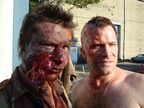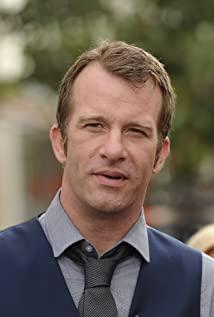I think it is necessary to talk about the remaining 20%, that is, the protagonist's corpse love complex. Of course, the following text only applies to the 80% of people who have seen or understood it.
Tip 1: Where did gina die?
Some comments said that Gina had been sleeping on the road and was killed by the protagonist at the rest stop, while others said that she was killed while burying her body. In fact, there are various signs that Gina is already a dead person at the beginning of this film, and the rest area is only a burial place for serial murders, not a murder place.
The first shot of Gina in the hotel bed is "necro", the messy hotel room has hints of violence, and the line "hey wake up sleepy head". And most importantly, she didn't appear in hotels and restaurants after "waking up", and she didn't appear in front of any third party. Of course not as a corpse, she can only be transferred directly from the bed in the hotel to the car by the protagonist. The moment Gina was dug up by the police, in the eyes of the protagonist, she was wearing the shorts she put on in the rest area, and the next scene turned into a nightgown, because she was a corpse herself, not killed later. .
Tip 2: Why is gina so cult?
Gina's behavior after "wake up" has been weird, including that nightgown and the masturbation scene in the car.
The truth is that Gina did not wake up, did not masturbate, did not participate in the burial of the corpse, nor did she have a dispute with the protagonist and then disappeared. All this was imagined by the protagonist facing a dead corpse.
Tip 3: Who is Gina?
She's just one of the many blond preys of the protagonist who is killed in a hotel bed by a pretty Las Vegas chick, who is put on a cheap ring. She probably never married the protagonist, who in addition to being a serial killer and psychopath, is also a necrophile. In addition to killing blond girls, he also likes to "marry" their corpses, and then "wedding night drive" with their corpses until he goes to the rest station to bury them.
In fact, the aesthetic taste of corpse love permeates the whole film, from the color to the lens, to the general car window scene and starry sky of Huangquan Road.
-------------------------------------split line----------- ---------------------------- The
above is my 20%, and then summarize the 80% mentioned in the other analysis:
Bloodyface seems to represent the "sense of fear" of the protagonist. The scenes of the three people in the car are all imagined by the protagonist. It is impossible for Gina to interact with bloodyface as a dead person. The sense of fear and the protagonist's id had a fight, and finally the id killed the sense of fear. The place where the body was buried for the first time was the abandoned rest area in reality, and he buried the fear. As a dead body, of course Gina couldn't bury him, so there was a scene where Gina suddenly disappeared and appeared in the car.
The next episode is about "trust" as he and her corpse wife go from suspicion, quarrel to reconciliation, and the scene also returns to the clean and bright "resting area of the past". "Trust" is closer to the ontology of necrophilia, that is, "only a dead bride can be trusted". He was about to continue his wonderful corpse-loving journey when he remembered his watch (the "fear" lingered all the time) and ran back to dig up the corpse. In fact, what really happened during this time was that the "sense of fear" was resurrected and taken over, and Gina's body was buried.
I tend to think that the cops and detectives are in his head too, which is to say, the whole movie is just himself and a corpse. The police car is accompanied by the supernatural appearance of lightning. The police and the detective are too strange. The dialogue between the detective and him is more like a dialogue between different personalities in the heart. The moment of escaping from the pursuit is also very strange, as if his mental power broke out to make the car transparent, and then Makes a crash, and then escapes the "police" in his head. Stay on 95, 95 can be the road or the era of the first kill in the past. . . As for the statement that "the detective is an old Indian chief", I think it is a bit far-fetched. Let's interpret the phrase "son" as a manifestation of "order", "law" or "paternal authority". These personalities appeared one after another when he struggled whether to bury the body or continue traveling with it, whether to repeat the previous murder story or come up with something new. "Trust" wants to continue the journey with the bride, and emotions such as fear and order try to stop him. In the end, he was unwilling that his corpse bride was buried by the "sense of fear", and while frantically accelerating to find the "sense of fear", he rolled over and died.
The final question: Is the protagonist a living person or a wandering spirit caught in the cycle of death? That is, is the film about his pre-death story or the afterlife? What the hell is bloodyface? Is it a traveler in the infinite loop of time and space? Is it a split personality? Or another part of Wandering Soul?
Time travel does not seem to be the focus of this film. It is too sci-fi to understand Raiden as a crack in time and space, and it completely deviates from the aesthetic taste of this film. So we assume that the infinite loop of space-time is not true.
Then, bloodyface is not a traveler in the infinite loop of time and space, nor is it just a split personality of the protagonist when he is alive (because he wakes up from the back seat with obvious memories of later episodes), he should be part of the protagonist's ghost after death .
The wakeup call and monologue replay at the end of the credits deepened my understanding.
-------------------------------------split line----------- ----------------------------
80%+20%, pieced together the whole story as I understand it: a serial killer who loves corpses uses similar methods to kill many times, and the last time he met a girl who was most attracted to him (you are the one where I quit my job and went into a killing frenzy. I met the only one I was truly satisfied with after my career). He was reluctant to bury the body, but the lingering fear forced him to do so, and then he fantasized about being discovered by the police and escaped, overturning and dying in a frenzy. His soul reincarnates his pre-death memories in two ways: his id wakes up after a wake up call, forgets the whole story, and hits the road again with his own corpse bride, and another part of his soul with great fear Feelings and part of the memory before the car accident wake up and try to stop the story from happening again.
Of course, the plot is only part of the movie. This is a suspense movie, not a detective movie. It's totally cool to watch without analyzing these logical things.
View more about Dark Country reviews











